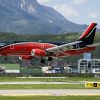 The aviation community is buzzing – pilot shortage is threatening to shake up the industry. With the International Civil Aviation Organization (ICAO) predicting that by 2026 over 350,000 pilots will be required to sustain operations, it could seem that it would be easy to get a pilot’s role. Yet the reality is far from this – becoming a pilot is still as challenging as ever, therefore preparing for the interview process might be the key bridge between a candidate and their dream job. Martin Horan, a learning and development consultant and instructor at Aeroclass, an aviation digital learning platform, shares tips and insights on pilot recruitment and the interview process.
The aviation community is buzzing – pilot shortage is threatening to shake up the industry. With the International Civil Aviation Organization (ICAO) predicting that by 2026 over 350,000 pilots will be required to sustain operations, it could seem that it would be easy to get a pilot’s role. Yet the reality is far from this – becoming a pilot is still as challenging as ever, therefore preparing for the interview process might be the key bridge between a candidate and their dream job. Martin Horan, a learning and development consultant and instructor at Aeroclass, an aviation digital learning platform, shares tips and insights on pilot recruitment and the interview process.
Prepare in advance
Throughout his career, Horan found that various airlines have unique approaches to their staff and hiring processes. “One airline might prioritise exceptional passenger experience, while another emphasises efficiency as their primary driving force. Therefore, it is crucial to research the airline you plan to join in advance by exploring its mission statement, objectives, and values. This knowledge can enable you to use the appropriate buzzwords during an interview, creating a synergy that aligns with the company’s goals.”
According to him, for aspiring pilots, it is essential to prepare by examining the job ad, as it may indicate the questions you will be asked during the interview. “For example, if an airline seeks candidates with good coordination, mathematics, and physics awareness, you should consider highlighting these skills during the interview process.”
Practising with a trial interview is also a valuable way to become more comfortable and confident before the actual interview. “You may ask someone to conduct the interview or even record yourself answering questions. Doing so can help you navigate tricky questions that might arise during an interview. For instance, instead of reciting your CV when asked to tell something about yourself, you can share a few career highlights that demonstrate why you are the ideal candidate for the job. By conducting a mock interview, you can refine your answers and improve your overall performance.”
Choose relevant examples
Horan explains that airlines seek a diverse range of skills when expanding their pilot teams, such as spatial awareness, effective communication, and the ability to make swift decisions. “During the interview process, the interviewer may ask open-ended questions to gather information about your background, particularly if you have limited real-world experience. Examples of such questions might include “Tell me about a time when you had to make a quick decision with limited time available” or “Share an experience where you faced a challenging situation while driving a car.” By asking such questions, the interviewer seeks to assess your ability to perform the necessary tasks in the future, based on your past experiences. Therefore, it is important to prepare by reflecting on your past experiences and choosing relevant examples that demonstrate your skills and ability to succeed in the role.”
Mistakes can be avoided
Horan notes that one of the most common mistakes during the interview process is being overly prepared. “While it is essential to prepare in advance, having a rigid script in mind, or worse, on paper, does not present you in the best possible light. Airlines seek candidates who are natural and authentic. However, it is crucial to be careful while answering questions truthfully. For example, when asked where you see yourself in five years, it is not wise to respond by stating that you hope to work for their competition. Instead, you can be truthful while also framing your response in a positive and professional manner.”
Dealing with rejection
According to Horan, rejection is an inevitable part of the job-seeking process. However, it is crucial not to become disheartened by rejection. “Try to seek feedback on what areas need improvement. While not all airlines or recruitment managers may offer valuable feedback, it is essential to reflect on your performance and consider areas that require improvement. You can ask yourself questions such as “What could I have done better?” or “How can I improve my skills for future opportunities?”. By focusing on personal growth and continuous improvement, you can turn rejections into valuable learning experiences that will help you secure your dream job in the future.”
Key to success
Horan emphasises that enthusiasm is the most critical factor in securing a pilot’s job and building a successful career. “Approach the interview with a positive and enthusiastic mindset, genuinely excited to work for the airline. Being a pilot is an incredibly rewarding profession with vast potential for growth, and if you possess the necessary skills and motivation to pursue this career, I encourage you to go for it.”





